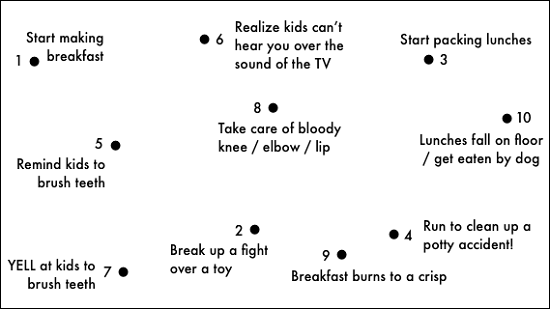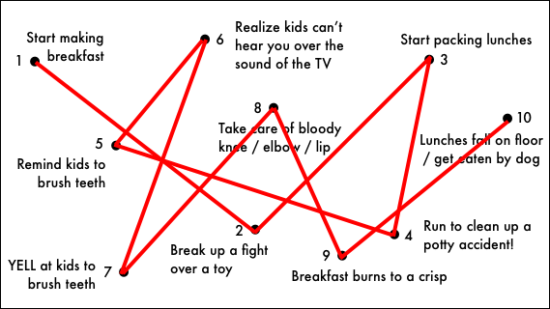via PBS parents: Living with kids is inherently chaotic. Children are messy, uncoordinated, and excitable, and need your help to do almost everything. For an illustration of exactly what we’re talking about, just connect the dots below to reveal a picture of what a particularly crazy morning might look like at your family’s house:
Looks messy, huh?
If it also looks familiar, then now might be a good time to make sure you’re keeping your household’s kid-induced chaos level in check. And there’s a really great reason to do so.
Researchers at the University of Louisville, Columbia University, New York University and Virginia Polytechic Institute studying the effect of household chaos—defined by disorganization, lack of routine, excessive noise, crowdedness, lots of coming and going, or an overly fast pace—have found that that the more chaotic a family’s life is, the more likely their children are to encounter a number of issues, including:
- smaller vocabularies and lower IQs
- higher levels of attention, aggression and conduct problems
- delay-of-gratification limitations
- more stress
- poorer and less consistent sleep patterns
- less positive relationships with parents and siblings
- worse overall health
Household chaos is so detrimental to kids that even the best parenting practices can’t overcome its effects. Multiple studies have shown that chaos leads to negative outcomes for kids, no matter what your parenting style is, how much money your family may have, or what your kids’ personalities are like. That means that chaos can happen in any home—even if you’re doing everything else right!
How can you tell if your house is too chaotic?
If you have kids, some level of household craziness is completely normal. But how much is too much? Here’s a collection of actual statements used by researchers to determine just how chaotic peoples homes are. Ask yourself how much you agree with each of the following—completely, not at all, or somewhere in between:
- There is very little commotion in our home.
- We can usually find things when we need them.
- No matter how hard we try, we always seem to be running late.
- It’s a real zoo in our home.
- At home we can talk to each other without being interrupted.
- There is often a fuss going on in our home.
- No matter what our family plans, they usually don’t work out.
- I often get drawn into other people’s arguments at home.
- Our home is a good place to relax.
- First thing in the day, we have a regular routine at home.
You can probably figure out which answers above point to potential chaos problems. If you can’t figure it out because you’re too busy putting out figurative and/or literal fires in your family room, you definitely have some issues to work on!
How can you fix household chaos problems?
If you think your home may be a little too chaotic for comfort, it’s easy to improve your situation ASAP!
By replacing chaos with calmer, more structured family time, you can experience more positive family interactions, better opportunities for making happy family memories, and benefits to your child’s social and emotional development. Here are five simple ways to get started:
- Be a little boring
Design a basic structure for your family’s day, complete with predictable, regular times for you to do normal, everyday stuff—like getting ready for the day, doing homework, sitting down with the whole family for dinner, and getting ready for bed. Having a set of activities everyone can count on will help you and your child meet daily challenges and free you up for more leisure time. - Slow down
Have extracurricular activities overtaken your family? Avoid overscheduling, and you’ll gain more opportunities to make memories together as a family. - Get personal
Recognize that not every family’s routines are the same. Think about what kinds of routines would be most effective at leading to productive and rewarding interactions for your family. - Prioritize
When trying to organize a particularly chaotic home life, start with small, manageable goals. Consider which changes would benefit your family the most and attack them first. Is your house always too loud for anybody to think? Try instituting set times for noisy activities like watching TV, playing games or banging away at that drum set Grandma so thoughtfully got for your little one’s birthday. After you’ve successfully made a change or two (and your house has started becoming less chaotic as a result), you’ll probably find future changes become easier to implement. - Chart your progress
Try giving your kids a personalized checklist of the things they’re responsible for doing before school or at bedtime. Seeing the physical schedule in front of them will help them remember everything they’re supposed to do—and being able to check off each item as they get things done throughout the day can make it more fun, too!
Which steps do you plan to take to decrease the chaos in your house?




